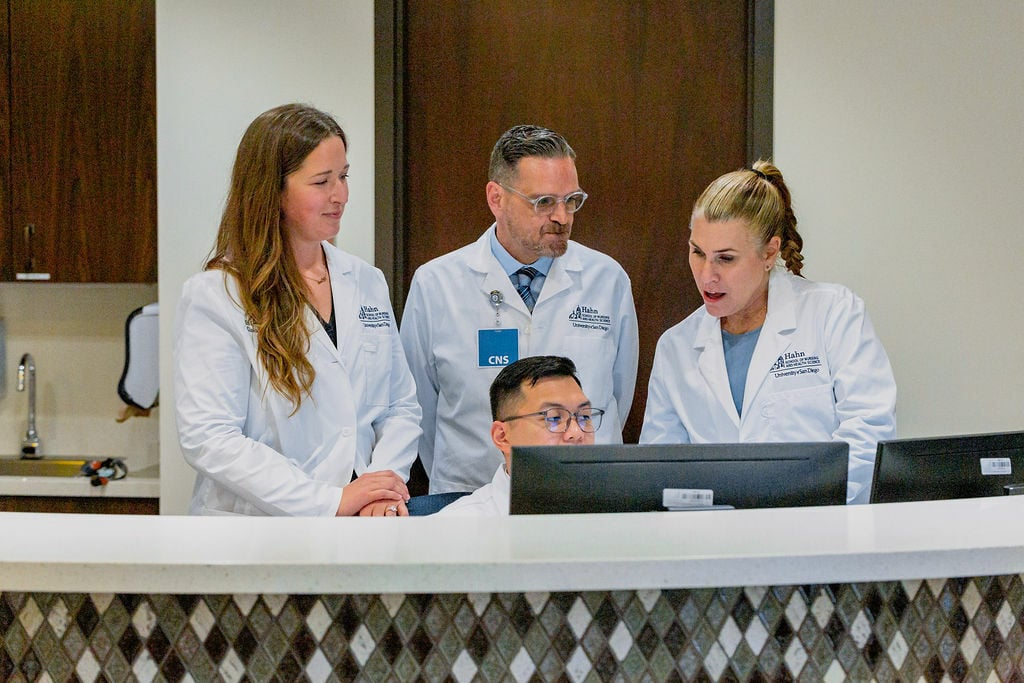
Discover the Benefits of a Nursing Degree From USD
The information in this blog post is for informational purposes only and is not intended to replace medical, financial, or professional advice.
As the landscape of health care continues to evolve, leaders in nursing are in high demand. The U.S. Bureau of Labor Statistics anticipates nursing leadership and management jobs will grow 28% through 2031. Nurse leaders have a unique opportunity to play key roles in leading, changing, and improving the design and delivery of the health system and practice environments.
If you're interested in pursuing a career that concentrates on the successful delivery of healthcare services and strategic leadership, becoming a nurse leader may be the right path for you.
Let's take a look at some ways to break into the nursing leadership and management field and explore careers you can obtain as a nurse leader.
What is a nurse leader?
Nurse leaders often fill positions of high authority and responsibility, but their roles as nurse leaders go far beyond any job title they might hold. Whether it's through high-level systems leadership or one-on-one mentorship, nurse leaders seek to improve health systems, provide guidance to fellow nurses and healthcare professionals, and utilize critical thinking and problem-solving abilities to administer optimal patient care.
Nurse leaders implement direct change through a number of daily tasks, including:
- Overseeing the organization and duties of healthcare teams
- Advocating for and against certain health legislation
- Delivering patient-centered care
- Mentoring the next generation of nurses
Our healthcare system needs nurses to lead the charge in ensuring individual health needs are met, all while balancing efficiency, care quality, and patient safety.
How to become a nurse leader
1. Earn a quality nursing leadership degree
It is highly suggested that aspiring nurse leaders earn a Master of Science in Nursing with an emphasis on nursing leadership and management to adequately prepare them for the field. After obtaining an MSN, nurses seeking leadership roles often obtain certification from the American Nurses Credentialing Center (ANCC) in nursing executive practice and advanced nursing executive practice; and from the American Organization for Nursing Leadership (AONL) in executive nursing practice or nurse manager and leader.
2. Gain hands-on experience from expert nurse leaders
Finding your nurse leadership style is easier when you have access to and can learn from nursing experts across many specializations. Becky Coulter, BSN, RNC-NIC, Executive Nurse Leader Alumna at USD and Clinical Nursing Supervisor in the NCIU at Sharp Mary Birch Hospital For Women and Newborns, credits the Executive Nurse Leader (MSN) program at the University of San Diego Hahn School of Nursing and Health Science with providing her important networking opportunities in her quest for a nurse leader role.
“The professors are easy to talk to, provide advice, and give direction. The health care community in San Diego is very small and the wonderful network of people I have been exposed to is a huge benefit of doing a local campus-based program.”

The professors are easy to talk to, provide advice, and give direction. The health care community in San Diego is very small and the wonderful network of people I have been exposed to is a huge benefit of doing a local campus-based program.- Becky Coulter, Executive Nurse Leader (MSN) alumna
When asked to offer advice to students struggling to decide whether to enroll in the program, Coulter was adamant: "Apply! The program provides the tools you need to be successful as a nurse leader. The ENL program does require a major time commitment, but the professors understand that students are working full-time and many are working mothers. They are flexible if things come up at work and very understanding."
Read more about Becky’s story by downloading our guide: Becoming an Executive Nurse Leader.
3. Display the characteristics of a nurse leader by mastering the 5 core competencies
The USD MSN Executive Nurse Leader (ENL) program is based on the Nurse Leader competencies outlined by the American Organization for Nursing Leadership (AONL). These competencies provide the framework for the knowledge, skills, and abilities associated with effective leadership. ENL candidates must develop competency in:
- Leadership – Developing leadership qualities in nursing such as emotional intelligence, mentorship, and a commitment to excellence is a core requirement for nurses overseeing healthcare systems. The ENL trains and supervises RNs and medical support staff. They collaborate with higher-level management on various tasks to streamline healthcare services.
- Communication and Relationship Management — A nurse executive takes on responsibilities that put them on a larger, more public stage. They must be able to communicate effectively and build trust and respect with physicians, with the community, and within their own teams.
- Understanding of the healthcare environment – The ENL has a firm grasp of industry standards for nurses in management roles. They improve management operations by using emotional intelligence, original thinking, and applying foundational knowledge of the health care system.
- Professionalism – The nurse executive models nursing best practices for medical support staff, including evidence-based practice methods. They display outstanding professionalism in the workplace by advocating for RNs and patients, critical thinking in nursing leadership management, and offering strategic input for innovative decision-making.
- Business skills and principles – The ENL must hold management skills and understand the business basics for nursing. They develop hospital unit budgets, oversee the hiring process for healthcare organizations, and determine the best medical technologies for patient care.
Nursing leadership careers
Earning your Executive Nurse Leader MSN from the University of San Diego Hahn School of Nursing and Health Science allows you to pursue many avenues in nursing — even nursing jobs away from the bedside. Graduates of the program possess a broad skill set suitable for both clinical and non-clinical roles.
The Executive Nurse Leader program allows you to take nursing leadership and management roles such as:
Nurse Manager
A Nurse Manager (NM) monitors the workload of RNs and medical support staff in their department. Tasks include outlining orders, reviewing caseloads, leading staff conferences, and holding one-to-one meetings with RNs. By exhibiting excellent leadership qualities in nursing, the NM motivates RN and medical support staff to deliver error-free treatment and assist patients with compassion and integrity.
Nursing Director
The Nursing Director, sometimes known as the Chief Nursing Officer, oversees all departments. Nursing Directors play a crucial role in designing patient care. Daily duties range from improving training programs for RNs to revising annual budgets. Nurse Directors uphold ethical and professional values to safeguard patients and their families. They identify and supply solutions for problems presented by staff.
Quality Improvement Specialist
The Quality Improvement Specialist (QIS) is responsible for improving health care by identifying issues with treatment protocols and advocating for RNs. The QIS gathers clinical data to evaluate trends in the health care system as well as patterns in the delivery of health care. They determine if policies and ethical standards are effectively enforced.
Patient Safety Specialist
The Patient Safety Specialist (PSS) is employed to evaluate and improve levels of safety in a healthcare environment. The PSS identifies risk factors for hospital-acquired complications that endanger patients. Daily responsibilities include assessing the safety level of a treatment protocol, evaluating the safety knowledge of RNs, and delivering their findings to executive-level staff.
Clinical Educator
A Clinical Educator, also called a Nursing Professional Development Specialist, assists the Nursing Director with staff training. The CE works with RNs who require additional education to learn specialized medical procedures. Additionally, they coordinate with the PSS to ensure RNs employ the highest standards for patient safety.
Jumpstart your journey in nurse leadership and management at USD
If healthcare is a wheel, nurses are the hub — and their spokes reach out to touch every aspect: the patient, the family, the physicians and care team, the treatment plan, the medications, etc. This is one of the many reasons nurses make such great leaders, and it's one of the reasons USD focuses so highly on nurse leadership. We understand what can happen when you let nurses lead.
We believe that nurse leadership is key to rehabilitating our ailing healthcare system. Nurse leaders are cornerstones of any healthcare organization. Executive Nurse Leaders set the stage by focusing on the leadership, communication, and management required to help healthcare environments put their employees and their patients first. A master's in nursing leadership and management helps future nurse leaders develop such skills, preparing them to thrive in their field.
For more information about the University of San Diego's Executive Nurse Leader (MSN) program, we invite you to request more information and download our guide on becoming an executive nurse leader.
The information provided by USD’s Hahn School of Nursing and Health Science is for informational purposes only and is not intended to replace professional medical or financial advice. This includes, but is not limited to, blog posts, eBooks, webinars, emails, graphics, social media posts, and other content. Always seek the guidance of your physician or a qualified medical or financial professional.
A Guide to Becoming an Executive Nurse Leader
The University of San Diego's nursing program ranks among the best in the nation. But that's not the only reason future students walk through our doors to pursue one of our graduate degrees. View our guide for an in-depth look at the Executive Nurse Leader - Hybrid (MSN) program and how our rich heritage of excellence in nursing education can help you achieve your academic and professional goals.
GET THE GUIDE







